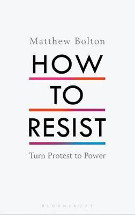How to resist: Turn protest to power by Matthew Bolton

Bloomsbury, 2017. ISBN 9781408892725
(Age: Secondary - Adult) Recommended. Matthew Bolton was Citizen
UK's lead organiser for the national Living Wage Campaign whereby
different community groups united to win the 'national living wage'
for low-paid workers. In this little pocket-sized book he shares
what he has learnt about campaigning on social justice issues -
'practical tools and principles to show how people can get together
and make change happen'. He puts great emphasis on democratic
participation, helping people to be effective citizens. It would be
really useful for students of Civics and Citizenship to read this
book, to go beyond the feel-good protest march, and gain the sense
of empowerment from actually uniting and achieving goals through
well-planned strategies.
History students would also gain greater insight into civil rights
movements of the past. Bolton reveals how the famous incident where
Rosa Parks refused to give up her seat on the bus was not just
frustration at the end of a long hardworking day; Rosa had been
active in the civil rights struggle for ten years before the bus
action. But at the right moment her action captured national
attention.
Similarly the strategy of 'action in the provocation of
overreaction' is illustrated by the events of Selma 1964-65. Selma
was chosen by Martin Luther King and other key civil rights leaders
precisely because of its reputation for violent conduct towards
African Americans. The violence directed towards a peaceful march at
Selma drew national attention and became impossible to ignore.
Other strategies are revealed in the book - with lessons learnt from
the failures as well as the successes. There are many useful tips,
but none more useful than the Iron Rule - shift from trying to solve
people's problems for them, to building the capacity of people for
collective action and political change. It is a great lesson. I
think all readers could learn something from this guidebook.
Helen Eddy